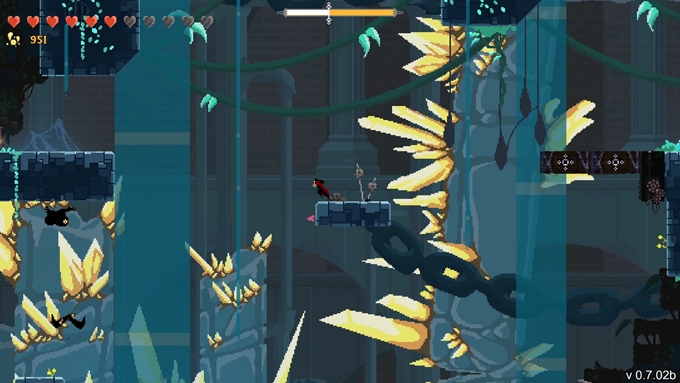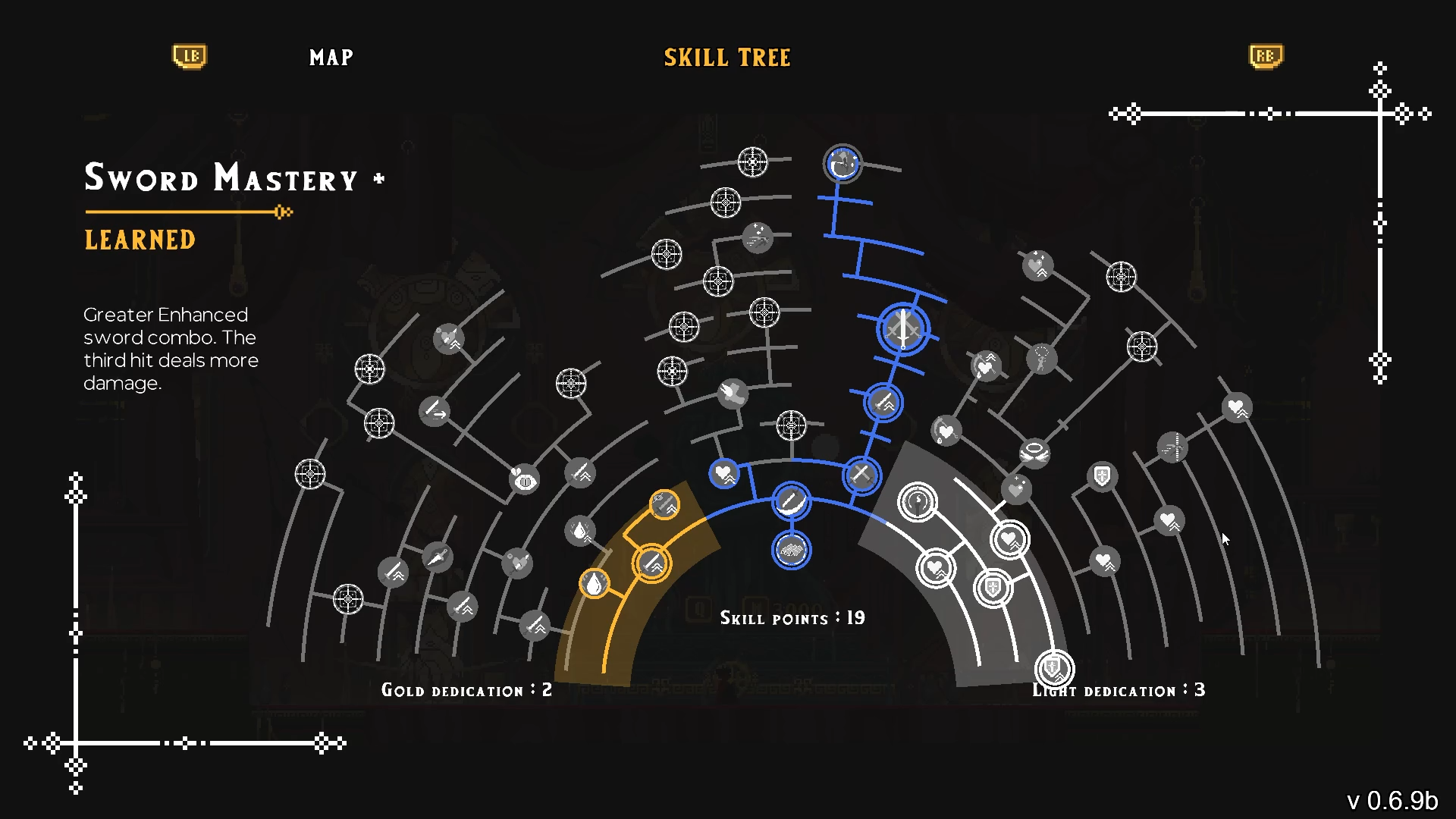The nearly golden touch.
The Metroidvania has been a go-to genre for many indie developers over the years. Its approach to combat, exploration, puzzle-solving, and challenging boss encounters has made it the type of experience that many studios produce in droves. However, to succeed in such a crowded genre, that experience needs to stand out. While Noreya: The Gold Project has a gorgeous presentation, and an interesting approach to its skill tree, its other components lack that execution for it to truly be that next big hit.
The game sees you in the role of Kali, a warrior who is transformed into a dark shade of herself by the God of Greed. When she awakens in this new form, she will enter the City of Gold and have to determine which god she is going to support. This allegiance then dictates much of her skill tree as aligning yourself with one will subtract from the other.
The bulk of the story is found at alters that will usually have a narrative built around what you are needing to know at that moment or relative to the area you find them in. A few of these alters also hint at ways to counter a certain god’s power, something that aids in granting a true final battle, one that while a tad predictable, is the more enjoyable final encounter of the two.
While the appeal of a Metroidvania is discovering the various tools to help you expand the map further and often using those tools to aid in combat, there is often an organic pacing to discovering these abilities to further your exploration in ways that feels satisfying. While you'll find the wall jump skill easy enough, I traversed more than half the map before I even came close to finding the next ability that would help me for the rest of the game. Whether that is bad design or my own failings, I like to think it rests somewhere in between.
While exploring and combat become infinitely better once you gained all the skills, the wall-jump rarely felt good through my entire time with it, at least when using the analog stick. Once I swapped exclusively to the D-pad, it was far easier to pull off, but Kali won't consistently bounce off the wall unless she has just began her slide down. While this is a split-second observation, many encounters and platforming require the splittest of seconds to survive, especially a certain worm battle that tanked my performance on the Steam Deck to nearly single digits.
As you align yourself with either the God of Gold or the God of Light, you’ll have a skill tree that is dictated by the level of prayer. There is a center skill trees that is neutral, providing enhancements to new and existing abilities. Each of the skill trees that are dictated by your allegiance, will have upgrades such as boosting your vitality, your ability to earn health back on attack, to its power of regeneration. Assuming the God of Gold had something up their sleeve, and that the God of Light offered the better skill tree, I opted to largely side with the God of Light, assuming that they too were up to no good.
One aspect of the allegiance system that I am unsure just exactly what it means is that when you choose one over the other, parts of the map will fluctuate between Gold or Light. If you select Gold in one instance, a few rooms that you have progressed through via the Light will disappear but still exist. Visiting those rooms never seemed to change anything. Even after beating the game, I am still clueless as to what it means.You can even swap between maps but I never really saw the reason for it.
To work through the skill tree, you’ll need to have skill points to sink into those upgrades. This is by spending the overall currency you’ll earn as you explore the map, defeat enemies, dethrone bosses, and more. It’s pretty easy to earn this currency as everything you do rewards you with a sizable amount. Thankfully, you don’t lose your currency upon death, especially since some bosses, or at least one in particular, can instantly kill you should you even make contact with it.
Combat can often be rather enjoyable, especially as you start to get more powerful, unlock abilities like the dash, as well as the projectile that spews forth from your sword. Once you start to flesh out your kit, then I started to see what the team had intended. That said, until those additions are available, you often feel like combat is far too limiting, especially as there is no dodge roll, block, or parry system to counter incoming attacks. This often means you are taking damage regardless of your skill.
A short way into the game, you’ll be able to split yourself off into a spectre version of yourself. This allows you to not only combat enemies that were once invincible, but to use different platforming elements that were previously locked off, with the same being said for a variety of hazards. This feature is rather interesting and while it’s not fully developed into anything impressive, it still allowed for a ton of well-designed puzzles as you lead a purple flame to its goal.
Noreya: The Gold Project has a gorgeous aesthetic and pixelated look to it that does a lot of the heavy lifting. There are several environments that truly look fantastic with a ton of background detail that was not present during earlier builds of the game. Boss designs and many of its creatures are extremely interesting, with many of them having a gold aesthetic that makes them stand out. While Kali is a very small character on the screen, her animations and design is impressive and I’m eager to see where her journey continues, that is if you took the time to get the true ending.
While Kali’s journey may be more inspired than original, Noreya: The Gold Project is nonetheless a pretty solid Metroidvania, but does suffer from a few issues that could feel very limiting to seasoned players of the genre. It’s far more simple than I had hoped for, but I still found it to be impressive nonetheless, coming across as being a great time for the 8 or so hours it took to complete.
Developer - Dreamirl. Publisher - Dreamirl, Pixel Heart. Released - June 21st, 2024. Available On - Steam. Rated - (N/A) - Descriptors unavailable. Platform Reviewed - Steam / Steam Deck. Review Access - A review code was provided by the publisher for the purpose of this review.














Jeff is the original founder of Analog Stick Gaming. His favorite games include The Witcher III, the Mass Effect Trilogy, Hi-Fi Rush, Stellar Blade, Hellbade: Senua’s Sacrifice, and the Legend of Heroes series, especially Trails of Cold Steel III & IV.